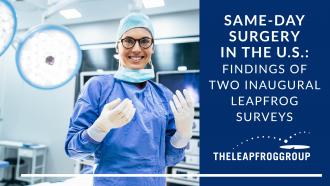
The Leapfrog Group, a national watchdog organization of employers and other purchasers focused on health care safety and quality, today released a report summarizing trends on the safety and quality of care for same-day surgical services nationwide: Same-Day Surgery in the U.S.: Findings of Two Inaugural Leapfrog Surveys. The report is a first and notable expansion in the organization’s data gathering and reporting enterprise, which for nearly 20 years has brought the public transparent information on inpatient care. In this inaugural effort, Leapfrog gathered data on several important areas of outpatient care including basic facility information; medical, surgical and clinical staff; volume and safety procedures; patient safety practices; and patient experience.
While aggregate findings are currently available in a national report for the public, individual facilities that completed the Surveys received confidential benchmarking reports illustrating their performance. Beginning with the 2020 Surveys, Hospital Outpatient Department (HOPD) and Ambulatory Surgical Center (ASC) Survey Results will be publicly reported by facility on The Leapfrog Group’s website. Results will be published in a way that allows consumers, purchasers, and payors to compare ASC and HOPD performance side by side.
“Today, more than 60 percent of surgical procedures take place in an outpatient environment,” said Leah Binder, president and CEO of The Leapfrog Group. “Despite this increasing shift towards same-day procedures, surprisingly little information about the safety and quality of these settings is available to the public. That’s why Leapfrog made the commitment this past year to expand our ratings to include same-day surgery.”
The preliminary findings in this national report are based on data voluntarily submitted by 321 ASCs and 1,141 HOPDs across the country that had responded either to the Leapfrog ASC Survey or the Leapfrog Hospital Survey by August 31, 2019. Both Surveys remain open for late submissions through November 30, 2019. Similar to Leapfrog’s other public reporting programs, the Surveys were developed with guidance from Leapfrog’s national Expert Panel and the Armstrong Institute for Patient Safety and Quality at Johns Hopkins Medicine. They include standardized, evidence-based measures of care specific to places that perform ambulatory and outpatient procedures.
The Leapfrog Hospital Survey and Leapfrog ASC Survey have brought to light some key findings about these facilities, detailed below.
- There are gaps in the education, training and national certifications of clinicians in both ASCs and HOPDs. Both ASCs and HOPDs showed gaps in ensuring all providers performing surgery or anesthesia were board certified. Of further concern, while nearly all ASCs and HOPDs always have a clinician present who is certified in Advanced Cardiovascular Life Support (ACLS) and can perform life-saving actions if complications arise, fewer facilities have clinicians certified in Pediatric Advanced Life Support (PALS). Parents should be aware of this gap and ensure the facility they choose for their child’s care has PALS-certified clinicians prior to scheduling a procedure.
- ASC and HOPD patients may experience gaps in communication before and after procedures. Encouragingly, nearly all ASCs and HOPDs ensure that patients know who to contact after-hours following their procedure if needed, though both types of facilities could do better at proactively contacting patients by phone within 24 hours after discharge. In both ASCs and HOPDs, most facilities are providing patients with surgical and anesthesia consent forms the day of the surgery. Patients would benefit from having this information in advance so they can more carefully consider the risks and develop questions to ask their providers.
- ASCs lag behind HOPD counterparts in implementing best practices for patient safety. All facilities that perform same-day surgery should be complying with best practices as identified by national organizations for infection prevention, hand hygiene and medication safety. Very few ASCs have an antimicrobial stewardship program in place and are also less likely to adopt practices such as monitoring for hand hygiene compliance. ASCs have many opportunities in the future to demonstrate improvement in this area, such as reporting to the CDC’s National Healthcare Safety Network (NHSN) to report infection rates and reporting to the Leapfrog ASC Survey in future years.
- Patients tend to give higher patient experience ratings to ASCs—but not enough ASCs monitor it. On the whole, patients reported their experience with ASCs to be more positive than that reported of HOPDs, though there are fewer ASCs participating in the standard patient experience survey. Both ASCs and HOPDs can benefit from increased participation in the Consumer Assessment of Healthcare Providers and Systems Outpatient and Ambulatory Surgery Survey (OAS CAHPS), the tested and validated instrument for assessing patient feedback.
“All told, our hope is that the information in this report will be a first step to enlighten health care purchasers, payors and patients about the safety and quality of same-day surgery,” Binder said. “We commend participating facilities for their commitment to transparency by participating in these inaugural Surveys and look to all ASCs and HOPDs to follow their colleagues’ leadership.”
To view the full report, visit Leapfrog’s website. ASCs and HOPDs that have not yet completed a 2019 Survey can still do so prior to the late submission deadline of November 30. Facilities submitting by this date will receive a customized benchmarking report. To get started, visit www.leapfroggroup.org/ASC and contact Leapfrog’s Help Desk.
